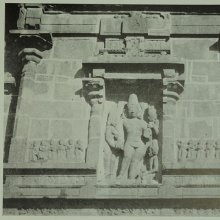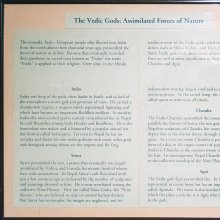Demigods: 1 definition
Introduction:
Demigods means something in Hinduism, Sanskrit. If you want to know the exact meaning, history, etymology or English translation of this term then check out the descriptions on this page. Add your comment or reference to a book if you want to contribute to this summary article.
Images (photo gallery)
In Hinduism
Vaishnavism (Vaishava dharma)
Source: Pure Bhakti: Bhagavad-gita (4th edition)Demigods (देमिगोद्स्) refers to “(1) Celestial deities (2) Godly beings situated in the higher planets who are endowed with great piety and who have tremendous life spans and whose mental and physical prowess is superior to humans. They are entrusted with specific powers for the purpose of universal administration”. (cf. Glossary page from Śrīmad-Bhagavad-Gītā).

Vaishnava (वैष्णव, vaiṣṇava) or vaishnavism (vaiṣṇavism) represents a tradition of Hinduism worshipping Vishnu as the supreme Lord. Similar to the Shaktism and Shaivism traditions, Vaishnavism also developed as an individual movement, famous for its exposition of the dashavatara (‘ten avatars of Vishnu’).
See also (Relevant definitions)
Full-text (+135): Kubera, Agnishvatta, Yaksha, Guhyaka, Vikshinaka, Purusha-sukta, Vrishakoshtha, Shivagana, Pramathagana, Deva, Vasu, Rudrabali, Bhutanatha, Ashvinikumaras, Devarshi, Devaraja, Vishvedeva, Adhidaiva, Pramathatva, Bhutagana.
Relevant text
Search found 55 books and stories containing Demigods; (plurals include: Demigodses). You can also click to the full overview containing English textual excerpts. Below are direct links for the most relevant articles:
Shrimad Bhagavad-gita (by Narayana Gosvami)
Verse 7.23 < [Chapter 7 - Vijñāna-Yoga (Yoga through Realization of Transcendental Knowledge)]
Verse 9.25 < [Chapter 9 - Rāja-guhya-yoga (Yoga through the most Confidential Knowledge)]
Verse 3.11 < [Chapter 3 - Karma-yoga (Yoga through the Path of Action)]
Chaitanya Bhagavata (by Bhumipati Dāsa)
Verse 2.20.132 < [Chapter 20 - The Glories of Murāri Gupta]
Verse 2.23.333 < [Chapter 23 - Wandering about Navadvīpa On the Day the Lord Delivered the Kazi]
Verse 2.18.149 < [Chapter 18 - Mahāprabhu’s Dancing as a Gopī]
Brihad Bhagavatamrita (commentary) (by Śrī Śrīmad Bhaktivedānta Nārāyana Gosvāmī Mahārāja)
Verse 2.2.40 < [Chapter 2 - Jñāna (knowledge)]
Verse 2.2.41 < [Chapter 2 - Jñāna (knowledge)]
Verse 2.2.16 < [Chapter 2 - Jñāna (knowledge)]
Garga Samhita (English) (by Danavir Goswami)
Verse 2.16.32 < [Chapter 16 - The Worship of Tulasī]
Verse 5.8.44 < [Chapter 8 - The Killing of Kaṃsa]
Verse 1.11.64 < [Chapter 11 - Description of Śrī Kṛṣṇacandra’s Birth]
Song 5 < [Bālya-līlā (Ages 1-5—Pastimes)]
Song 29 < [Śacī-mātār Śoka (Mother Śacī’s Grief)]
Song 3 < [[Introduction]]
Bhajana-Rahasya (by Srila Bhaktivinoda Thakura Mahasaya)
Related products




